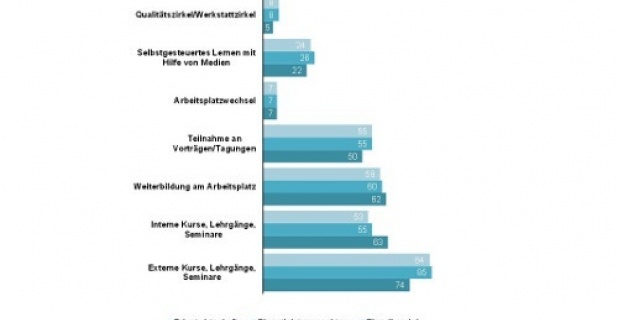The options for a successful career in retail are getting more and more varied which can be accomplished both with professional training and with a retail-oriented degree program. Yet even after a successful career start, you need to continue your education on a regular basis to stay up to date.
The percentage of college graduates in retail keeps increasing over the past few years. This is due to the increasing complexity of processes. The increasing internationalization in retail also results in new challenges. Retail employees need to handle increasing and constantly changing job requirements. New products demand new product knowledge; the modernization of business processes requires managerial know-how; the penetration of the retail market with new technology requires IT expertise, and customer focus doesn’t just require sales skills, but also the ability to recognize and analyze customer demands as well as continue to enjoy dealing with customers.
Knowing what the customer wants – getting to know the POS
There is still one criterion that applies to all retail employees in equal measure: you need to understand customer wishes to be personally successful and contribute to the success of the company. This is why practical work experience and sound knowledge of tasks and responsibilities at the point of sale are essential.
This is also the point of view from the German Trade Association (German: Handelsverband Deutschland, HDE). It views retail as one of those economic sectors where the German phrase “having a career through vocational training” still holds true. Many managers in high positions and also many independent retailers have acquired the skills that make them so successful through professional training and subsequent continuing education in retail.
Salesperson and retail merchant are the most popular vocational careers
According to the HDE, the most important vocational careers in retail in Germany are still retail merchant (currently approximately 66,000 apprentices) and sales person (presently about 48,000 trainees) even though retailers offer vocational training in a great number of professions.
Almost three quarters of trainees in retail learn one of these two professions, which prepare them for multifaceted tasks and managerial functions. During their training, they get to know the fundamental areas of retail. This includes sales and customer service for instance, application of inventory management systems, merchandise presentation and the continuing development of product lines.
This is why vocational training as a salesperson and merchant is an important prerequisite to later qualify for continuing education. The most important continuing education programs in retail are the Bachelor of Business Administration (German: Geprüfte/-r Handelsfachwirt/-in) and retail assistant (German: Geprüfte/-r Handelsassistent/-in Einzelhandel). Continuing education increases the chances for career advancement – only a Bachelor of Business Administration for instance makes it possible to become a district manager or regional sales manager.
Of course, it can also make sense for employees with the corresponding education to continue with academic studies, which is the prerequisite for executive positions. Even though an employee can also move up to a managerial position, if you want to become a branch manager in a larger house for instance however, you should study – business administration for example.
Different forms of continuing education are being offered
In 2011, 74 percent of retail businesses that offer continuing education options utilized external courses, training courses and seminars for professional training as was determined by the Institute for Employment Research (German: Institut für Arbeitsmarkt- und Berufsforschung, IAB) in its ”industry survey for the retail sector“ in 2013. Internal classes, training courses or seminars (63 percent), on the job training (62 percent) and participation in lectures and conferences (50 percent) are other popular forms of continuing education. The online portal einzelhandelskauffrau.org has compiled a selection of institutes that offer corresponding training courses here. The Central Office for Vocational Training in Retail (German: Zentralstelle fuer Berufsausbildung im Handel) also provides a continuing education database.
Continuing education as a remedy for staffing problems
For retailers, vocational training is therefore particularly important. Yet continuing education and qualification of employees is also very significant, since it is a great tool to address the emerging staffing problems. Based on the demographic change and the resulting impending shortage of skilled employees, promoting continuing education programs is an important human resources measure to continue to meet the demand for trained staff.
However, retail is also facing particular problems in this instance. Employers are aware of the fact that comparatively unattractive working conditions create a problem with personnel recruitment. Flexible working time schedules with frequent work on weekends and evenings, comparatively poor compensation and a large number of part-time employees are a part of everyday life in retail. This generally makes this industry sector less attractive to job candidates than other sectors.
Advantages for employers and employees
According to the industry study by the IAB, retail businesses don’t worry about skills shortage the same way the private sector and service sector do. However, this could prove to be shortsighted, since human resource strategies like the promotion of continuing education, as well as the creation of attractive working conditions are the key to meeting the personnel needs of the future.
Continuing education therefore plays a particularly large role in retail. On the one hand, this applies to employers of course, but on the other, it also similarly applies to the employees in the retail sector. With the right qualifications and commitment, they can direct their own career in a brand-new direction with new responsibilities– and more so than in other industry sectors.
Author: Daniel Stöter, iXtenso.com










